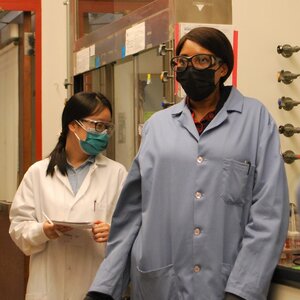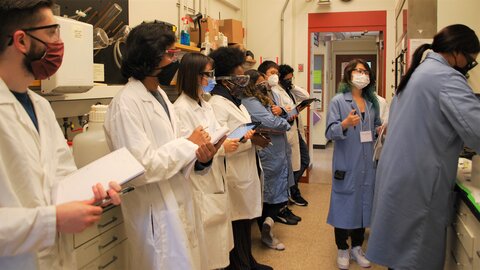Chemistry professor Joaquín Rodríguez-López realized several years ago that the incoming graduate researchers joining his lab could benefit from a brief but intensive training that drills down into more in-depth electrochemistry methods.
“Electrochemistry is a relatively simple science to deploy. But you need a whole set of concepts and background to support your knowledge to actually do high-quality electrochemistry,” said Rodríguez-López, J. Andrew and Susan S. Langan Professorial Scholar, and Associate Professor of Chemistry.
Research in the Rodríguez-López group combines interests in electroanalytical chemistry and energy materials by developing chemically-sensitive methods for studying ionic and electronic reactivity in nano-structures, highly-localized surface features, and ultra-thin electrodes. So he organized a multi-day intensive training experience that progresses from basic concepts, experiments, and analysis to ones that are more advanced, especially focusing on common issues in electrochemistry that could make a difference in how experiments are perceived.
This intensive training experience that he first organized in 2012 has now grown into a three-day “Electrochemical Bootcamp” that not only includes members of his own lab – with more experienced students doing the teaching and newer members learning – but it also draws graduate students and postdoctoral researchers from other UIUC labs and from other colleges and universities.
The 2022 boot camp had 45 participants with 20 on a waitlist. The majority are from UIUC, but participants also came from Milliken University, both Southern Illinois University campuses, University of California-Davis, University of California-Los Angeles, University of Texas-El Paso and Rice University.
“A really high demand. We could have organized an entire boot camp with those on the wait list. It was very popular,” said Rodríguez-López, who explained that in other labs on campus and at other colleges and universities, there is growing interest in electrochemistry as renewable energies become much more important. “I think more research groups are starting to venture into electrochemistry.”
The ultimate goal is a much deeper knowledge of electrochemistry that goes well beyond what most undergraduates would learn in an electrochemistry course, according to Rodríguez-López.
“It also helps establish the culture of what our laboratory is,” Rodríguez-López said referring to the development of his own research group.
For students from other labs, Rodríguez-López said many of them leave with some useful techniques to employ by seeking a collaboration, or convincing their advisor to buy necessary instruments, or by seeking out these instruments in their home departments. And they lose the fear of doing experiments like this..
In the near future, he said he will publish everything he has learned developing and growing this boot camp, so others can reproduce and modify their own boot camps.
“And this is a good tool for my graduate students, especially for senior graduate students and postdocs to experience designing an electrochemical demonstration or experiment and then teaching others,” he said.
Jeanne N’Diaye, a postdoctoral researcher in the Rodríguez-López lab, led one of the sessions during the 2022 boot camp. She said it’s not only a great opportunity for her to revisit concepts, but also learn new techniques, and hone her communication skills in relation to each group’s level of understanding.
“I really enjoyed interacting with students of all levels in electrochemistry,” she said. “This is a great opportunity for students to have hands-on exposure to new concepts and gain a great understanding of electrochemistry.”
Rodríguez-López hopes to continue growing the program and securing more funding, which could open the door for international participants.
“If we keep expanding it and get more funds to support international travel, I think it would make a really, really interesting experience," he said.
The majority of the program is funded through the National Science Foundation.
— Tracy Crane, Department of Chemistry

